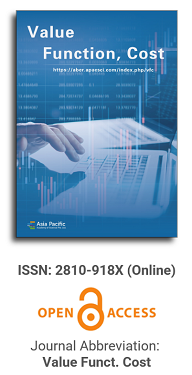
Publication Frequency
bi-annual
Journal Articles
Search
Search scope
Journal Center
Asia Pacific Academy of Science Pte. Ltd. (APACSCI) specializes in international journal publishing. APACSCI adopts the open access publishing model and provides an important communication bridge for academic groups whose interest fields include engineering, technology, medicine, computer, mathematics, agriculture and forestry, and environment.
Volume Arrangement
2021
Assessing the impact of climatic factors on the trade performance of South African maize commodity
Article ID: 1613
Vol 1, Issue 1, 2021
DOI: https://doi.org/10.54517/vfc.v1i1.1613
Vol 1, Issue 1, 2021
Download PDF
Abstract
The maize commodity is of strategic significance to the South African economy as it is a stable commodity and therefore a key factor for food security. In recent times climate change has impacted on the productivity of this commodity and this has impacted trade negatively. This paper explores the intricate relationship between climatic factors and trade performance for the South African maize. Secondary annual time series data spanning 2001 to 2023, was sourced from an abstract from Department of Agriculture, Land Reform and Rural Development (DALRRD) and World Bank’s Climate Change Knowledge Portal. Autoregressive Distributed Lag (ARDL) cointegration technique was used as an empirical model to assess the long-term and short-term relationships between explanatory variables and the dependent variable. Results of the ARDL model show that, average annual rainfall (β = 2.184, p = 0.056), fertilizer consumption (β = 1.919, p = 0.036), gross value of production (β = 1.279 , p = 0.006) and average annual surface temperature (β = −0.650, p = 0.991) and change in temperature for previous years, (β = −0.650, p = 0.991) and the effects towards coefficient change for export volumes, (β = 0.669, p = 0.0007). In overall, as a recommendation, South African policymakers should consider these findings when developing strategies to mitigate the impacts of some of these climatic factors and implementing adaptive strategies for maize producers.
Keywords
ARDL model; maize; bound test; trade performance; South Africa
References
- Adisa, O. M., Hassen, A., Darkey, D., et al. (2018). Variability of Satelite Derived Phenological Parameters across Maize Producing Areas of South Africa. Available online: https://www.researchgate.net/figure/The-Map-of-major-maize-producing-Provinces-of-South-Africa-showing-the-Normalised_fig1_326877309 (accessed on 25 September 2024).
- Bozzola, M., Lamonaca, E., Santeramo, F. G. (2023). Impacts of climate change on global agri-food trade. Ecological Indicators, 154, 110680. https://doi.org/10.1016/j.ecolind.2023.110680
- Bradshaw, C. D., Pope, E., Kay, G., et al. (2022). Unprecedented climate extremes in South Africa and implications for maize production. Environmental Research Letters, 17(8), 084028. https://doi.org/10.1088/1748-9326/ac816d
- Department of Environmental Affairs. (2018). South Africa’s third national communication under the united nations framework convention on climate change. Department of Environmental Affairs.
- Esterhuizen, D., Caldwell, A. (2023). Grain and Feed Annual. USDA.
- Hedlund, J., Carlsen, H., Croft, S., et al. (2022). Impacts of climate change on global food trade networks. Environmental Research Letters, 17(12), 124040. https://doi.org/10.1088/1748-9326/aca68b
- ITC. (2024). Trade Map. Available online: https://www.trademap.org/ (accessed on 25 September 2024).
- Meuwissen, M. P. M., Feindt, P. H., Spiegel, A., et al. (2019). A framework to assess the resilience of farming systems. Agricultural Systems, 176, 102656. https://doi.org/10.1016/j.agsy.2019.102656
- Mishra, P., Padhy, C., Mishra, N., Malluri, S. (2024). Role and Approaches of Agricultural Extension in Climate Resilient Agriculture. International Journal of Agriculture Extension and Social Development, 7(5), 343–348. https://doi.org/10.33545/26180723.2024.v7.i5e.629
- Mosikari, T. J., Mmelesi, K. (2024). Threshold Effect of Trade on Climate Change in South Africa. Nature Environment and Pollution Technology, 23(1), 435–442. https://doi.org/10.46488/nept.2024.v23i01.038
- NAMC. (2024). The NAMC Profile. Available online: https://www.namc.co.za/about-us/profile/ (accessed on 25 September 2024).
- Qasim, R., Alam, D. (2023). An Empirical Investigation of India’s Money Demand Function: An ARDL Approach. Research gate, 13.
- Shoko, R. R., Chaminuka, P., Belete, A. (2019). Maize yield sensitivity to climate variability in South Africa: Application of the ARDL-ECM approach. Journal of Agribusiness and Rural Development, 54(4), 363–371. https://doi.org/10.17306/j.jard.2019.01201
- Simanjuntak, C., Gaiser, T., Ahrends, H. E., et al. (2023). Impact of climate extreme events and their causality on maize yield in South Africa. Scientific Reports, 13(1). https://doi.org/10.1038/s41598-023-38921-0
- World Bank. (2021). Climate Risk Country Profile: South Africa. World Bank Group.
- Zenda, M., Rudolph, M. (2024). A Systematic Review of Agroecology Strategies for Adapting to Climate Change Impacts on Smallholder Crop Farmers’ Livelihoods in South Africa. Climate, 12(3), 33. https://doi.org/10.3390/cli12030033
Supporting Agencies
Copyright (c) Value, Function, Cost

This work is licensed under a Creative Commons Attribution-NonCommercial 4.0 International License.

This site is licensed under a Creative Commons Attribution 4.0 International License (CC BY 4.0).
Editor-in-Chief
Zhibiao Gao
Nankai University, China
News & Announcements
2024-03-07
The Global Value Chain Development Report 2021 has been Officially Released
On November 16, 2021, the third Global Value Chain Development Report, “Global Value Chain Development Report 2021: Beyond Production,” organized by the Global Value Research Institute of the University of International Business and Economics, was officially released. This online press conference is hosted by the Asian Development Bank (ADB), with Asian Development Bank economist Elisabetta Gentile presiding over the event. Masatsugu Asakawa, President of the Asian Development Bank, and Ngozi Okonjo-Iwaala, Director General of the World Trade Organization, delivered speeches and gave high praise to the third development report.

